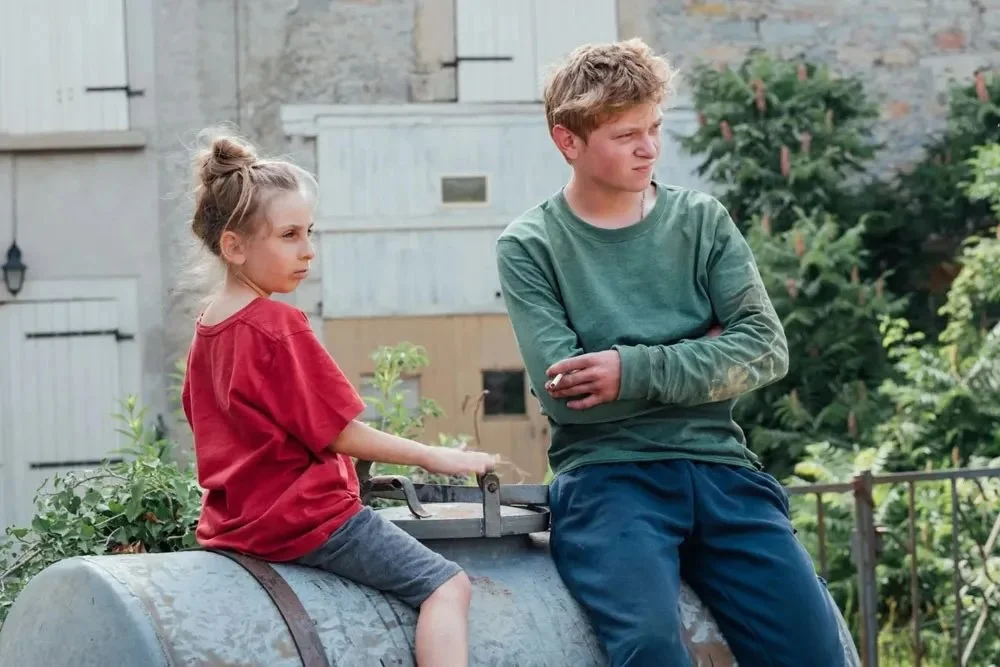HOLY COW is a fairytale premise grounded in honest charm
Holy Cow
Directed by Louise Courvoisier
Written by Louise Courvoisier and Théo Abadie
Starring Clément Faveau
Unrated
Runtime: 1 hour and 31 minutes
Opens Friday, March 28 at NYC’s Film Forum
by Zakiyyah Madyun, Staff Writer
A young man learns how to make cheese in the hopes of winning a hefty grand prize? This premise and its charming title sound straight from the pages of a picture book, but Louise Courvoisier’s Holy Cow is grounded and refreshingly honest in its storytelling. Set in the Jura region of France, a rural area dominated by agricultural pursuits, Holy Cow tells the story of 18 year old Totone (played by Clément Faveau). His stagnant life of dirt bikes, petty fights, and day-drinking comes to an end when an unexpected accident leaves him the sole guardian of his younger sister. Down on cash and luck, and lured by the promise of prize money, Totone decides to get into the family business of cheesemaking.
Holy Cow’s cinematography is grounded in realism, and each shot is bright and full of life. The vibrance captures perfectly the feeling of coming of age in the summer. The acid green and neon yellow artificiality of the dirtbikes cuts against the natural beauty of the countryside. The film also approaches cheesemaking itself with a respect for the craft, and an attention to each stage of production. While Totone’s methods are unorthodox and occasionally illegal, his dedication is impressive.
No coming of age tale is complete without a bit of romance, and I really enjoyed the way the character of Marie-Lise (Maïwène Barthélém) was handled throughout the story. A farmer, she avoids trope as neither martyr nor dream girl, but as a confident and self-assured young woman portrayed with directness and sincerity. Her complexity is mirrored in Totone, who while fumbling and short-sighted is able to consistently challenge himself and adapt to his circumstances with a clear heart. He does this without any rambling monologues on the nature of grief, responsibility, and shame – conventions that I’ve come to expect but would have felt out of place in this story. Instead, Courvoisier shows us: in the long looks and silences, there is room to feel out Totone’s apprehension and complexities.
To be fair, Totone can’t exactly afford to take a break. While his younger sister, Claire (Luna Garret), confronts her new reality with a pragmatism far beyond her years, she is far too young to steer Totone independently. She does, however, manage to point him in the right direction. In one stand-out scene, she chastises her older brother for trying to send her to school in pajamas. He insists that no one will notice, but she knows better. Step by step, she teaches him how to take care of her – and to his credit, he takes each correction with grace.
In this way, the women of Holy Cow facilitate the dismantling of Totone’s darker impulses. In the beginning of the film, we see a young man headed towards an empty and increasingly destructive future. His perspective on sex is murky and self-centered, his reactions are impulsive and violent, and he makes decisions without taking consequences into account. While he is by no account a feminist icon, an amazing friend, or a trustworthy caretaker, he opens up a secret door to the possibility of his life moving in any, or even all of those directions. It’s clear that Totone has always been a man of action, but only through the painstaking process of making his first wheel of Comté does he learn how to make those actions count. Yes - it is a surprisingly silly sentence for a movie so full of heart. But it works!
This isn’t to ignore the other talented cast. Totone’s friends, in particular Jean-Yves (Mathis Bernard), challenge his indulgent nature while looking out for his best interests. There remains an undertone of fear and fragility even as these characters earnestly attempt to make things work. Totone and his cohort suffer in the extreme from teenage delusions of immortality, with no shortage of binge drinking and death-defying motorsports. The possibility of things taking a terrible turn lurks throughout the film, however close or far.
Behind the scenes, Holy Cow is also interesting in its unique directorial approach. I really enjoy when directors work with non-professional actors, and that happens to be the case for the entire cast of this project. Courvoisier’s pacing is excellent, and no scene is cluttered with excessive dialogue, theatrical performance, or a rush to an unnatural conclusion. Instead, even the ending of Holy Cow feels true, a slice of life that will continue on long after the credits roll.
Support MovieJawn Staff
–
Support MovieJawn Staff –
With the death of so much print media and meaningful journalism, it is important now more than ever to support the writers and outlets you love.
If you enjoyed this article, show your support by donating to our writer. All proceeds go directly to the writer. Recommended donation is $5.




